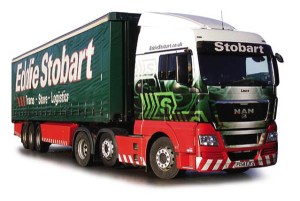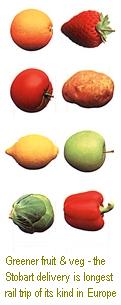 Eddie Stobart, the trans-European haulage company, is hoping to reduce its annual CO2 emissions by 8,600 tonnes by taking 30 of its articulated lorries off the roads between southern Spain and England in favour of a weekly low-carbon rail freight trip.
Eddie Stobart, the trans-European haulage company, is hoping to reduce its annual CO2 emissions by 8,600 tonnes by taking 30 of its articulated lorries off the roads between southern Spain and England in favour of a weekly low-carbon rail freight trip.
The Eddie Stobart train was loaded in Valencia on Tuesday with 30 refrigerated containers of fruit and vegetables and arrived yesterday at the company’s distribution hub in Dagenham, east London.
This week’s journey was the first time refrigerated rail containers had passed through the Channel rail tunnel and was only possible following guarantees from both the French and Spanish rail networks that the train, and its perishable goods, would not suffer major delays.
A spokesperson for the Environmental Transport Association (ETA) said “Eddie Stobart is trail blazing by moving its freight to rail in this way and we would hope to see others follow in its path.”
What are food miles?
 Put simply, food miles are the measure of the distance a food travels from the land to your plate. Food travels further nowadays mainly for three reasons: we buy seasonal food all year round; we buy more processed food; and, we like to pay as little for it as possible. Around a quarter of all road freight (by vehicle miles) is food. The quantity of food miles on our roads has doubled since 1974.
Put simply, food miles are the measure of the distance a food travels from the land to your plate. Food travels further nowadays mainly for three reasons: we buy seasonal food all year round; we buy more processed food; and, we like to pay as little for it as possible. Around a quarter of all road freight (by vehicle miles) is food. The quantity of food miles on our roads has doubled since 1974.
Consumers are also directly responsible for increased food miles. We now travel further for our shopping and use the car more often to do it. Each year, the average Briton travels about 135 miles by car to shop for food, more often than not making trips to large, out-of-town supermarkets. Considering that over half the population does not own a car the average motorist travels 270 miles a year.
Are food miles always bad?
Reports shows that it is less environmentally friendly to grow tomatoes in Britain under glass than it is to import tomatoes from Spain. The energy needed to heat the glass houses for growing tomatoes in Britain is significantly more than the energy used in transporting tomatoes from Spain where no heating is used because of the warmer climate. This is why the ETA says taxing CO2 production will bring the best solution. Please feel free to view our carbon offset options.
0 Comments View now